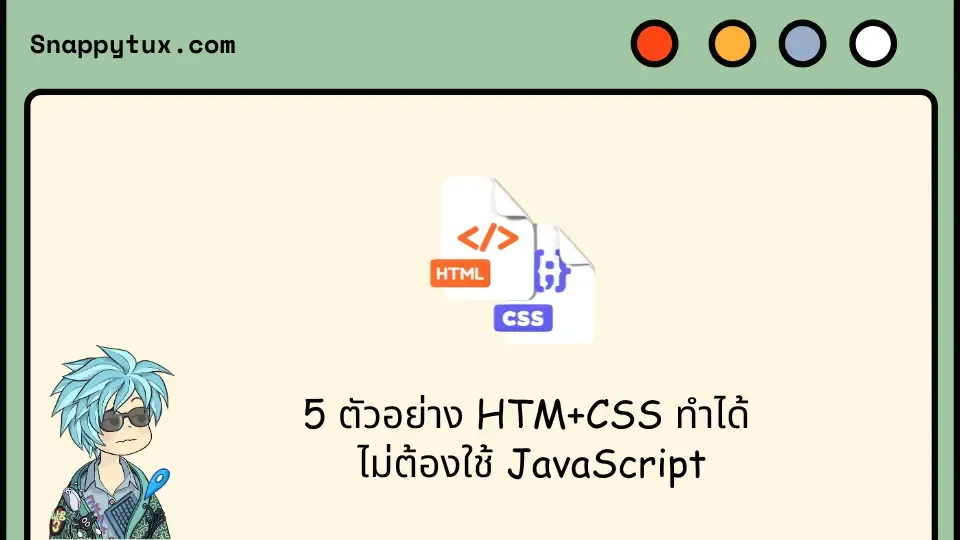
5 ตัวอย่าง HTM+CSS ทำได้ ไม่ต้องใช้ JavaScript
เดียวนี้พลังของ HTML+CSS ไปไกลมากแล้วไม่ใช่เพียงแค่ทำหน้าตาแสดงผลได้อย่างเดียว แต่มีลูกเล่นเพิ่มเติมให้กับคนใช้เว็บด้วย ซึ่งก่อนหน้านั้นความสามารถลูกเล่นต่าง ๆ เราจำเป็นต้องใช้ JavaScript มาช่วย
การที่เราเขียนเพียงแค่ HTML+CSS นั้นช่วยทำให้โค้ดของเราเรียบง่ายขึ้น ง่ายต่อการบำรุงรักษา และมักจะมีประสิทธิภาพมากกว่า วิธีคิดนี้มาจากหลักการพื้นฐานในการพัฒนาเว็บที่เรียกว่า "กฎของการใช้น้อยที่สุด" (Rule of Least Power)
กฎของการใช้น้อยที่สุด
กฎของการใช้น้อยที่สุดนั้นเรียบง่าย ใช้ภาษาที่มีพลังน้อยที่สุดที่เหมาะสมกับงาน ในการพัฒนาเว็บ นี่หมายถึงการเลือกใช้ HTML แทน CSS และใช้ CSS แทน JavaScript เมื่อเป็นไปได้ เหตุผลที่อยู่เบื้องหลังคือ
- HTML เป็นภาษาที่อธิบายได้และมีน้ำหนักเบา เหมาะสำหรับการจัดโครงสร้างเนื้อหา
- CSS ก็เป็นภาษาที่อธิบายได้เช่นกัน ใช้สำหรับการตกแต่ง มีตัวเลือกในการจัดเลย์เอาต์และการโต้ตอบมากมายที่ไม่จำเป็นต้องใช้ JavaScript
- JavaScript แม้จะมีพลังมาก แต่ก็เพิ่มความซับซ้อน มีต้นทุนด้านประสิทธิภาพ และมีความเป็นไปได้ที่จะเกิดข้อผิดพลาดได้มากเช่นกัน
ดังนั้น เรามาดูตัวอย่าง GitHub repository ที่จะแสดงให้เห็นถึงบ้างอย่างที่อาจเคยใช้ JavaScript แต่สามารถทำให้ได้ผลลัพธ์ที่ดีกว่าด้วย HTML และ CSS เพียงอย่างเดียว ตัวอย่างเหล่านี้จะแสดงให้เห็นว่าเราสามารถทำให้โค้ดเรียบง่ายขึ้นในขณะที่ยังคงรักษาฟังก์ชันการทำงานและประสิทธิภาพได้อย่างไร
ตัวอย่าง 1: Custom Switches (Checkboxes without JS)
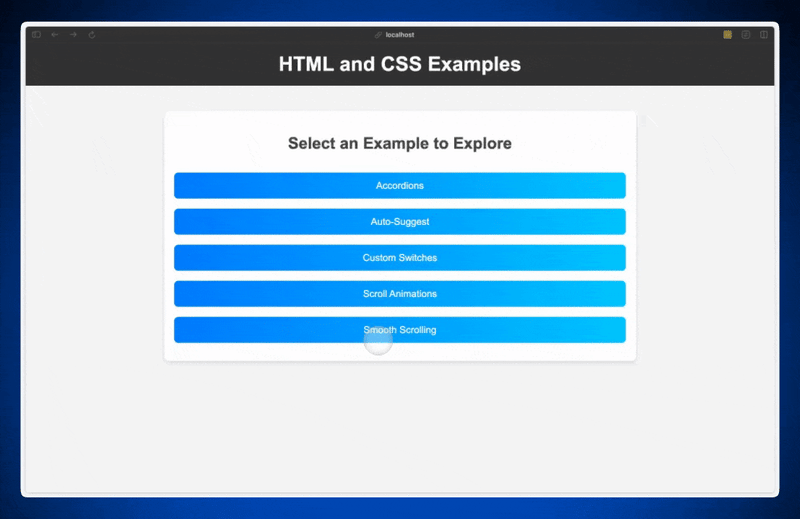
HTML
<label class="switch">
<input type="checkbox" class="switch-input">
<span class="switch-slider"></span>
</label>CSS
/* The outer container for the switch */
.switch {
position: relative;
display: inline-block;
width: 60px;
height: 34px;
}
/* The hidden checkbox input */
.switch-input {
opacity: 0;
width: 0;
height: 0;
}
/* The visible slider (background) of the switch */
.switch-slider {
position: absolute;
cursor: pointer;
top: 0;
left: 0;
right: 0;
bottom: 0;
background-color: #ccc;
transition: .4s;
}
/* The circle (slider button) inside the switch */
.switch-slider:before {
position: absolute;
content: "";
height: 26px;
width: 26px;
left: 4px;
bottom: 4px;
background-color: white;
transition: .4s;
}
/* Pseudo-class that styles the switch when the checkbox is checked */
.switch-input:checked + .switch-slider {
background-color: #2196F3;
}
/* Moves the slider button to the right when the switch is checked */
.switch-input:checked + .switch-slider:before {
transform: translateX(26px);
}ตัวอย่าง 2: Auto Suggest with <datalist>
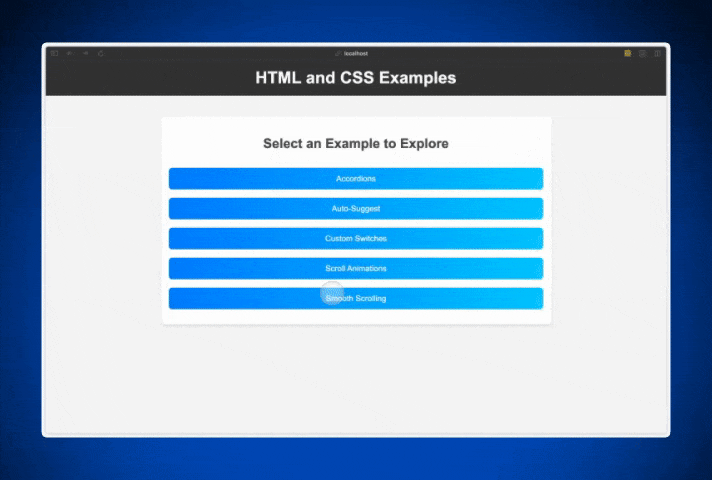
HTML
<input type="text" list="suggestions" placeholder="Choose an option...">
<datalist id="suggestions">
<option value="Open AI">
<option value="Open Source">
<option value="Open Source Software">
</datalist>CSS
.container {
width: 300px;
display: block;
}
input {
padding: 10px;
font-size: 18px;
width: 100%;
box-sizing: border-box;
}ตัวอย่าง 3: Smooth Scrolling with CSS
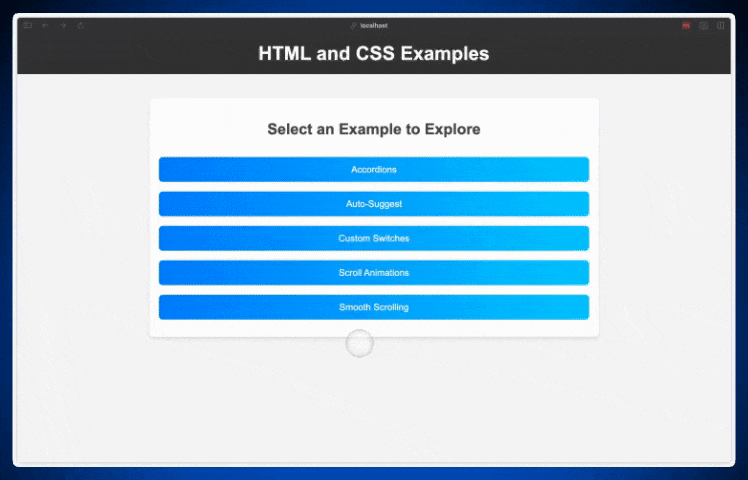
HTML
<nav>
<a href="#section1">Go to Section 1</a>
<a href="#section2">Go to Section 2</a>
<a href="#section3">Go to Section 3</a>
</nav>
<!-- Section 1 -->
<section id="section1">
<h2>Section 1</h2>
</section>
<!-- Section 2 -->
<section id="section2">
<h2>Section 2</h2>
</section>
<!-- Section 3 -->
<section id="section3">
<h2>Section 3</h2>
</section>CSS
/* Basic styling for sections */
section {
height: 100vh;
padding: 20px;
font-size: 24px;
display: flex;
justify-content: center;
align-items: center;
}
/* Different background colors for each section */
#section1 {
background-color: lightcoral;
}
#section2 {
background-color: lightseagreen;
}
#section3 {
background-color: lightblue;
}
/* Styling for the navigation */
nav {
position: fixed;
top: 10px;
left: 10px;
}
nav a {
display: block;
margin-bottom: 10px;
text-decoration: none;
color: white;
padding: 10px 20px;
background-color: #333;
border-radius: 5px;
}
nav a:hover {
background-color: #555;
}ตัวอย่าง 4: Accordions <details> และ <summary>
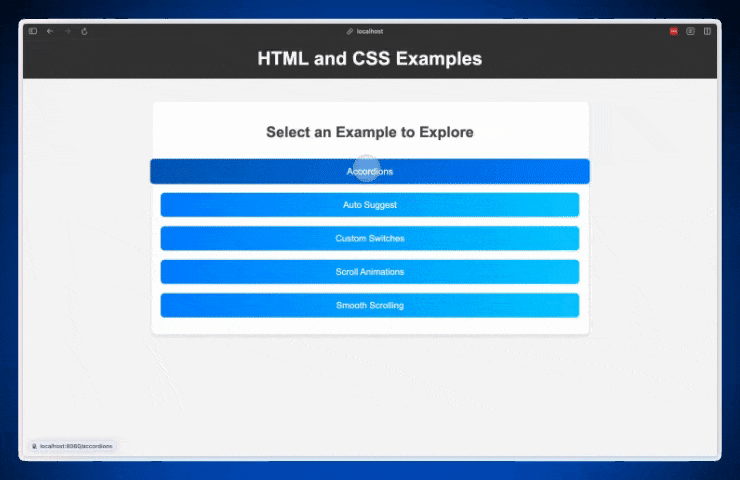
HTML
<details>
<summary>Click to toggle</summary>
<p>This is some content!</p>
</details>CSS
details {
width: 300px;
background-color: #f9f9f9;
padding: 20px;
border: 1px solid #ddd;
font-size: 18px;
}
summary {
cursor: pointer;
font-size: 20px;
font-weight: bold;
}
details[open] summary {
color: #2196F3;
}ตัวอย่าง 5: Scroll-Triggered Animations with CSS
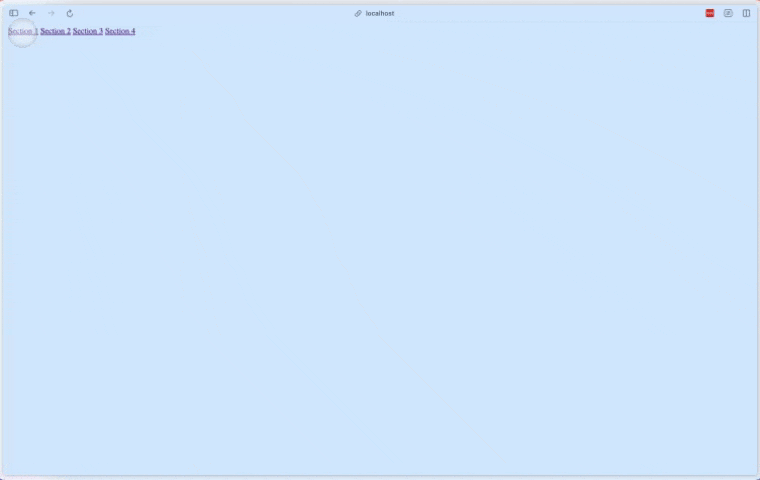
HTML
<body>
<!-- Navigation with anchor links -->
<nav style="position:fixed; top:10px; left:10px;">
<a href="#section1">Section 1</a>
<a href="#section2">Section 2</a>
<a href="#section3">Section 3</a>
<a href="#section4">Section 4</a>
</nav>
<!-- Section 1 -->
<section id="section1">
<h2>Welcome to Section 1</h2>
</section>
<!-- Section 2 -->
<section id="section2">
<h2>Welcome to Section 2</h2>
</section>
<!-- Section 3 -->
<section id="section3">
<h2>Welcome to Section 3</h2>
</section>
<!-- Section 4 -->
<section id="section4">
<h2>Welcome to Section 4</h2>
</section>
</body>CSS
html {
scroll-behavior: smooth;
}
/* Remove body margins */
body {
margin: 0;
}
/* Full viewport height for sections with centered content */
section {
display: flex;
justify-content: center;
align-items: center;
height: 100vh;
background-color: #f0f0f0;
transition: background-color 0.6s ease-in-out;
}
/* Styling for headings */
section h2 {
font-size: 36px;
margin: 0;
transition: transform 0.6s ease, opacity 0.6s ease;
opacity: 0;
transform: translateY(30px);
}
/* Add margin for scroll snapping */
section:nth-child(odd) {
background-color: #ffcccb;
}
section:nth-child(even) {
background-color: #d0e7ff;
}
/* Scroll-triggered animation */
section:target h2 {
opacity: 1;
transform: translateY(0);
}ยกเลิกความซับซ้อนด้วย HTML และ CSS
มีหลายกรณีที่เราสามารถหลีกเลี่ยงความซับซ้อนของ JavaScript ได้โดยการใช้ฟีเจอร์ที่มีอยู่ของ HTML และ CSS ซึ่งมันจะช่วยให้โค้ดของเราง่ายต่อการบำรุงรักษาและอ่านง่ายขึ้น ซึ่งพอมาดูโดยรวมแล้วมันเป็น "การใช้น้อยที่สุด" เพื่อทำให้ดีออกมาที่สุด โดยไม่จำเป็นต้องพึ่งพา JavaScript ที่ซับซ้อน
ลองไปปรับใช้กันดูนะ 😃
Thanks: https://dev.to/tinymce/5-essential-html-and-css-tricks-to-ditch-javascript-40kh
